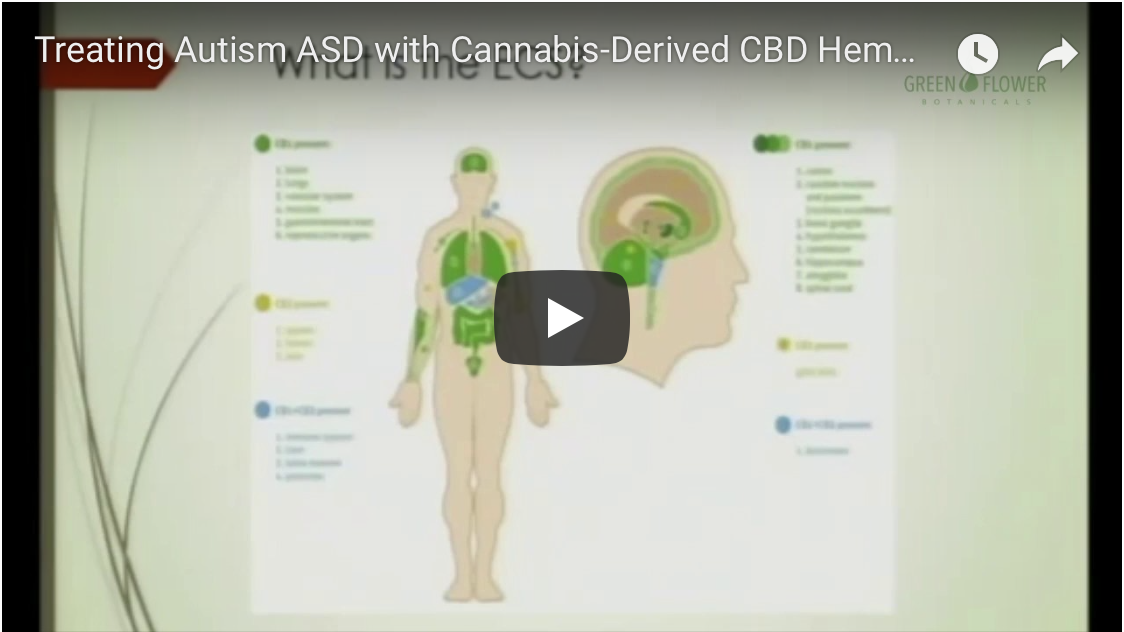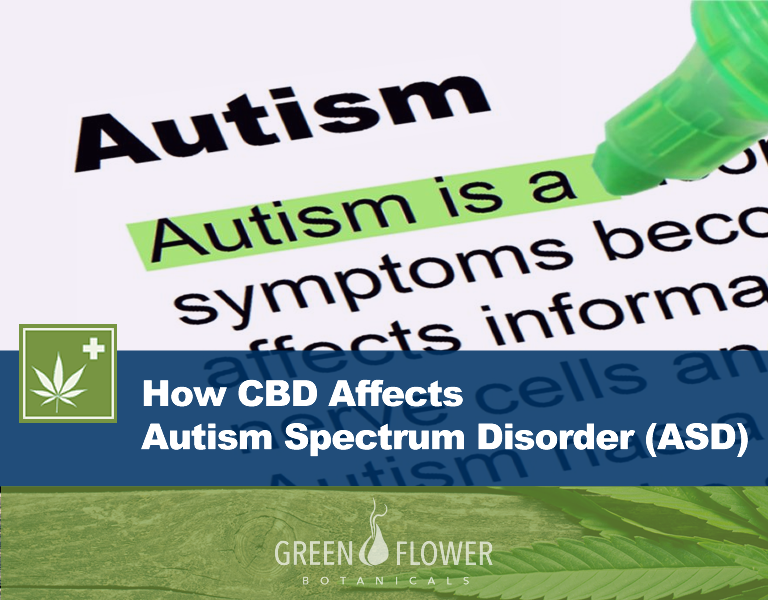Research on CBD Oil for Autism (ASD)
Research on CBD Oil for Autism (ASD) is more important today than ever before. Over the last three decades a marked increase in the number of children diagnosed with autism spectrum disorders (ASD) has been observed in the United States and around the world.1,2 (https://www.cdc.gov/ncbddd/autism/data.html, https://www.who.int/news-room/fact-sheets/detail/autism-spectrum-disorders) Anecdotal and empirical evidence of possible therapeutic effects of phytocannabinoids, especially CBD, has emerged.3 (https://n.neurology.org/content/90/15_Supplement/P3.318) As with epilepsy, parents of children with severe ASD are frustrated by the lack of treatment options for their children and are exploring cannabis as a potential solution. For a full list of the medical conditions for which CBD may be useful, please consult our research page.
What We Know about CBD Oil and Autism Spectrum Disorder (ASD)
Autism Spectrum Disorder (ASD) refers to a range of conditions primarily characterized by impairments in social behavior, communication and language. Individuals with autism also frequently suffer from anxiety (Read more about CBD oil and anxiety here), seizures (Read more about CBD and seizures here) and other non-specific symptoms for which CBD may also be effective. Autism is a neurodevelopmental disorder which may involve dysregulation of the endocannabinoid system (i.e. the ECS) (Learn more about the endocannabinoid system).4 (https://www.ncbi.nlm.nih.gov/pubmed/23643692) The mechanisms by which CBD oil may interact with the ECS to reduce the symptoms of autism are not clear, but they may involve regulation of GABA and glutamate, neurotransmitters involved in communication between different structures in the brain.5 (https://www.ncbi.nlm.nih.gov/pubmed/28880200)
In addition to anecdotal reports, preclinical studies of animal models of ASD suggest that the ECS is a viable therapeutic target for pharmacological interventions, including the use of synthetic cannabinoids to elucidate the role of cannabinoid receptors.5 (https://www.ncbi.nlm.nih.gov/pubmed/28880200) Human studies are few. An observational study published in 2019, documented 188 ASD patients treated with CBD-dominant cannabis oil between 2015 and 2017.6 (https://www.ncbi.nlm.nih.gov/pubmed/?term=30655581)
Almost 84% of participants reported either a significant (30.1%) or moderate (53.7%) improvement. Only 8.6% experienced no change in symptoms and only a quarter reported at least one side effect. A retrospective study published in 2018 investigated the use of CBD-dominant cannabis oil among sixty children with ASD.7 (https://www.ncbi.nlm.nih.gov/pubmed/?term=30382443). Behavioral problems were much improved, or very much improved, in 61% of patients. Anxiety and communication problems were much improved, or very much improved, in 86% of patients. Disruptive behaviors were also improved. The results of this study led to the development of a yet-to-be-published large, double blind, placebo controlled cross-over trial with 120 participants.8 (https://clinicaltrials.gov/ct2/show/NCT02956226) Also, in April, 2018 the University of California San Diego announced it had received a large private gift to fund a clinical trial investigating CBD as a treatment for autism.9 (https://ucsdnews.ucsd.edu/feature/is-cbd-a-remedy-for-autism-tbd)
Conclusion
Cannabidiol, and other phytocannabinoids found in CBD oil, appear to hold great therapeutic potential for the treatment of autism spectrum disorder (ASD). While the underlying mechanisms still need to be elucidated, the combination of anecdotal and observational studies have generated significant momentum for formal clinical trials. This area of cannabis research is evolving rapidly. Stay tuned!
Below is a list of available studies concerning the use of CBD, and other phytocannabinoids, in treating autism spectrum disorder (ASD).
Research Studies on the effects of CBD oil to treat Autism (ASD):
The current research abstracts and case studies as published at the US National Library of Medicine National Institutes of Health
- Endocannabinoid Signaling in Autism
- Mutations found in individuals with autism interfere with endocannabinoid signaling in the brain
- Cannabinoid receptor type 2, but not type 1, is up-regulated in peripheral blood mononuclear cells of children affected by autistic disorders
- A novel approach to the symptomatic treatment of autism
- Consequences of cannabinoid and monoaminergic system disruption in a mouse model of autism spectrum disorders
- Targeting the endocannabinoid system in the treatment of fragile X syndrome
- Deficient adolescent social behavior following early-life inflammation is ameliorated by augmentation of anandamide signaling
- How do I find the right dosage of CBD for Autistic-Related symptoms?
- What is CBD and how does it work?
- What is the endocannabinoid system and why it matters to your health?
What is Autism? A Brief Overview
Autism belongs to a wider group of ailments known as pervasive neurodevelopmental disorders that are caused by a combination of both genetic and environmental factors. Autism was first described and named 60 years ago. According to the Center for Disease Control and Prevention (CDC), approximately 1 in every 68 children suffers from some form of autism in the U.S alone. This represents a tenfold increase in the diagnosis of the condition over just four decades, and these numbers seem to be rising. Furthermore, boys are 4-5 times more likely to develop the condition compared to girls.
The disease is characterized by conspicuous cognitive and emotional isolation and detachment. Autistic children display; an inability to form human relationships, abnormal or absent speech, repetitive and stereotypic verbal and non-verbal behaviors, as well as a limited range of interests and activities.
Up until now, no behavioral, genetic, electrophysiological or brain imaging test can specifically validate a clinical diagnosis of autism. Furthermore, this disorder has no defined mechanisms of pathogenesis, which makes it very difficult to provide curative therapy. Nonetheless, the aforementioned procedures are often utilized to test for any syndromic forms of the illness.
The available treatments for autism can be grouped into: nutritional, behavioral and medical approaches. There is no defined standard approach for treating autism.
Autism is a devastating and so far, an incurable disease. The available pharmaceutical products have such limited efficacy and come with some serious side-effects. As a result, physicians and patients alike have been actively seeking out alternative therapies.
One of the best candidates so far is cannabidiol (CBD), a non-psychotropic compound derived from the Cannabis plant that has proven to contain a wide range of therapeutic effects. Here are some of the tests scientists have done with regards to the use of CBD for autism therapy.
References
2. Organization WH. Autism spectrum disorders. 2019; https://www.who.int/news-room/fact-sheets/detail/autism-spectrum-disorders.
3. ARAN A, Cassuto H, Lubotzky A. Cannabidiol Based Medical Cannabis in Children with Autism- a Retrospective Feasibility Study (P3.318). 2018.
4. Kerr DM, Downey L, Conboy M, Finn DP, Roche M. Alterations in the endocannabinoid system in the rat valproic acid model of autism. Behav Brain Res. 2013;249:124-132.
5. Zamberletti E, Gabaglio M, Parolaro D. The Endocannabinoid System and Autism Spectrum Disorders: Insights from Animal Models. Int J Mol Sci. 2017;18(9).
6. Schleider LB-L, Mechoulam R, Saban N, Meiri G, Novack V. Real life Experience of Medical Cannabis Treatment in Autism: Analysis of Safety and Efficacy. Scientific Reports. 2019;9(1):200.
7. Aran A, Cassuto H, Lubotzky A, Wattad N, Hazan E. Brief Report: Cannabidiol-Rich Cannabis in Children with Autism Spectrum Disorder and Severe Behavioral Problems-A Retrospective Feasibility Study. J Autism Dev Disord. 2019;49(3):1284-1288.
8. Cannabinoids for Behavioral Problems in Children With ASD – Full Text View – ClinicalTrials.gov. 2019; https://clinicaltrials.gov/ct2/show/NCT02956226.
9. Is CBD a Remedy for Autism? TBD. 2019.
[starbox id=jamie.corroon]
This page has been submitted in cooperation with our Medical Advisor, Dr. Jamie Corroon. Dr. Corroon has reviewed and approved the information contained on this page for general accuracy, authenticity, and relevancy of the stated research. While it is our intent to publish the most up-to-date research available, this review is limited to the material submitted on this page and does not take into account research which may currently exist or supersede this content. This review is for informational purposes only and does not constitute the practice of medicine. CBD products are not approved by the FDA for the diagnosis, cure, mitigation, treatment, or prevention of any disease. You should always seek the advice of your physician before adding any supplement to your diet.
Watch Related Video:
[spu popup=”7727″]
CBD and its implications on Autistic Spectrum Disorder (ASD)
[/spu]
In this video presented at Autism One, Dr Tracy Fritz M.D. discusses the implications of using Cannabidiol (CBD) to treat ASD. Length 36:48
Related Articles on CBD and Autism (ASD)
How CBD Affects
Autism Spectrum Disorder (ASD)
Medical Research on CBD (cannabidiol)
Clinical studies and case reports on CBD categorized by condition:
- General Research Acne ADD - ADHD Addiction AIDS ALS Alzheimers Anorexia Antibiotic Resistance Anxiety Arthritis Asthma Atherosclerosis Autism ASD Bipolar Disorder Cancer Chronic Pain Depression Diabetes Digestive Issues Endocrine Disorders Epilepsy - Seizures Fibromyalgia Glaucoma Heart Disease Huntington's Disease Inflammation Irritable Bowel Syndrome Liver Disease Metabolic Syndrome Migraines Mood Disorders Motion Sickness Multiple Sclerosis (MS) Nausea Neurodegeneration Obesity OCD Osteoporosis Parkinson's Disease PTSD Rheumatism Schizophrenia Sickle Cell Anemia Skin Conditions Sleep Disorders Stress Strokes


